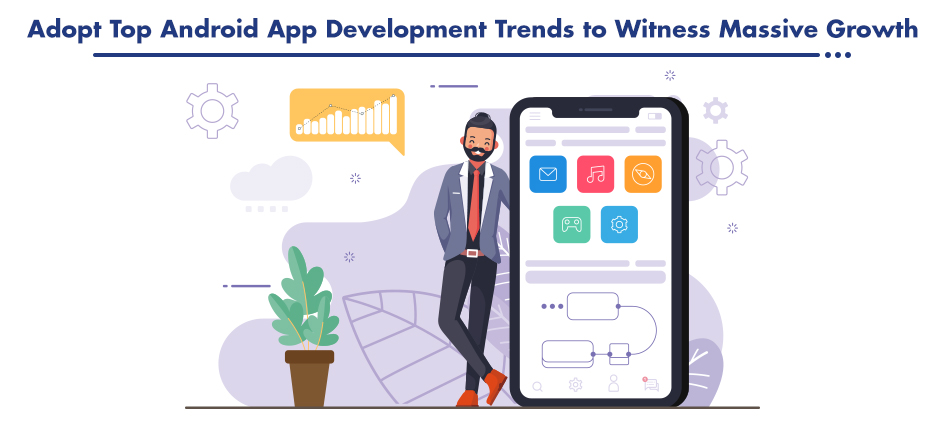Adopt Top Android App Development Trends to Witness Massive Growth

Android, since its inception, has come a long way with a market share of about 86% Android-based smartphones globally. The adoption of this operating system has grown by leaps and bounds in recent years, increasing the demand for Android applications.
Android app developers believe that the future of app development is quite promising, thanks to emerging technologies and trends. Businesses must incorporate these trends into their apps to experience massive growth and deliver the best customer experience.
Now let’s dive in to explore these Android app development trends and how you can make your app better than ever.
Instant Apps
An Android instant app isn’t a new kid on the block but has been gaining momentum since its emergence. The core idea behind these apps is to allow your users to test out a portion of your app without installing it on a device. It helps you to boost the installation rate of your app.
This is particularly a powerful technology for e-commerce businesses and game developers. Android instant apps enable users to play a game to a particular level. If the users find it interesting, they can download the game to their device.
The same goes for an e-commerce business. When customers search for a product on Google, they are redirected to instant apps that provide all the necessary product-related information. Thus, businesses belonging to the e-commerce industry can provide a better customer experience with an instant app.
From the Android app developers’ perspective, an instant app is relatively is easy to create. They can develop an app from scratch or transform your existing app using Android Studio, an integrated development environment (IDE).
Artificial Intelligence (AI)
Nowadays, almost everybody has experienced the benefits of AI in various aspects of life. However, when it comes to Android app development, artificial intelligence has a lot more to offer.
AI in Android applications allows you to improve customers’ experience by providing them with personalized offerings. You can quickly analyze customer behavior, product preferences, and interactions with your app, allowing you to devise better engagement plans.
Simply put, you can gather, store, and process a vast amount of data by integrating AI and ML into your app. Besides, you can also perform tasks like text recognition, face recognition, landmark recognition, barcode scanning, image labeling, and more.
TensorFlow Lite, Firebase MLKit, Google Cloud Vision API, and Neural Network API are some of the tools to develop such functionalities in your Android application.
Internet of Things (IoT)
IoT apps allow users to track their daily activities and processes. It has been anticipated that the IoT market will reach $1.6 trillion in 2025.
Being the biggest player in the market, Android is the preferred choice of businesses and Android app developers to build IoT applications. The combination of IoT and Android is quite useful for industries like healthcare, energy, e-commerce, Agriculture, and more.
For instance, a lot of IoT-based healthcare devices now track health conditions and transfer collected data to doctors. It helps doctors to diagnose their patients remotely.
Besides, IoT also plays a significant role in education. A lot of learning projects like C-Pen, Edmodo, and Nymi have integrated IoT to facilitate learning across the globe.
Android Jetpack
Android Jetpack is a suite full of libraries, tools, and guidelines for developers to build advanced apps. The primary goal of this suite is to facilitate regular app development tasks.
Google provides structured documentation, making it easy for Android app developers to use this tool. Mainly, there are four main components that we have outlined below.
Foundation – This component offers cross-cutting functionality like testing, backward compatibility, and Kotlin language support.
Architecture – It helps in developing robust, testable, and maintainable Android apps.
Behavior – These components allow developers to incorporate standard Android services like notifications, sharing, permissions, and more into the app.
UI – UI components provide widgets and helpers to make Android apps user-friendly.
Thus, the all-encompassing Android Jetpack expedites and facilitates the app development process.
Beacon and Location-Based Services
Google launched the Beacon platform to make apps and devices operate smartly due to timely and contextual information. This technology is used to define the precise location and contextual cues within applications and help users navigate the world. In brief, when a device comes in the range of a beacon, it gathers the users’ information like current position and what’s around.
Besides, a myriad of Android app developers shows inclinations toward location-based services (LBS) as they enhance users’ experience by providing real-time information. The huge success of Pokemon Go, a location-based augmented reality app, has elevated the demand for such apps or games.
The LBS can be implemented in various areas such as retail, marketing, indoor mapping, navigation, payment portals, tourism, and more.
Final Words
While Android app development trends continue to come and go, it is vital to quickly evaluate the latest technology updates and identify and seize opportunities.
These are some of the key trends having to potent to revolutionize your business and foster its growth. Though we have missed on many other Android app trends, but remember that not every trend is going to add value to your business. So, only adopt those that you think can take your business to the next level.
For more information or figure out which trend suits the best to your business, approach our Android app developers.

